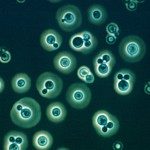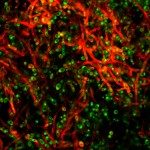Lien vers Pubmed [PMID] – 25267175
Fungal Genet. Biol. 2014 Dec;73:20-8
Opportunistic pathogens like Cryptococcus neoformans are constantly exposed to changing environments, in their natural habitat as well as when encountering a human host. This requires a coordinated program to regulate gene expression that can act at the levels of mRNA synthesis and also mRNA degradation. Here, we find that deletion of the gene encoding the major cytoplasmic 5’→3′ exonuclease Xrn1p in C. neoformans has important consequences for virulence associated phenotypes such as growth at 37 °C, capsule and melanin. In an invertebrate model of cryptococcosis the alteration of these virulence properties corresponds to avirulence of the xrn1Δ mutant strains. Additionally, deletion of XRN1 impairs uni- and bisexual mating. On a molecular level, the absence of XRN1 is associated with the upregulation of other major exonuclease encoding genes (i.e. XRN2 and RRP44). Using inducible alleles of RRP44 and XRN2, we show that artificial overexpression of these genes alters LAC1 gene expression and mating. Our data thus suggest the existence of a complex interdependent regulation of exonuclease encoding genes that impact upon virulence and mating in C. neoformans.



